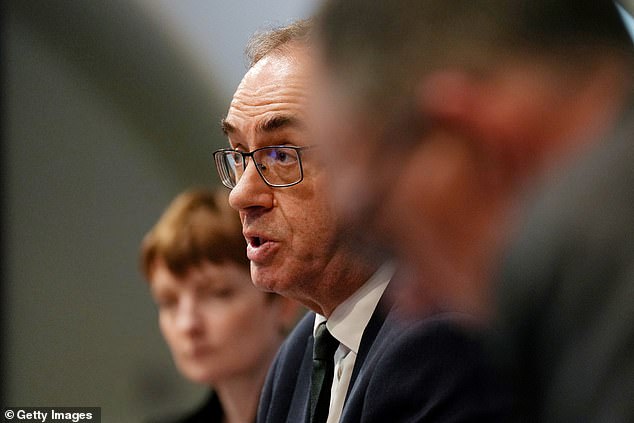Those of us who have complained of ‘groupthink’ on the Monetary Policy Committee (MPC) have been taught a lesson.
The May session of the interest rate-setting committee, which delivered a quarter of a percentage cut in bank rate to 4.25 per cent, saw a rare three-way split among participants.
Inflation hawks Catherine Mann and chief economist Huw Pill opted for the Federal Reserve route of stubbornly sitting on their hands in an age of unpredictability.
A majority, led by the Governor Andrew Bailey opted for a modest reduction in rates, reflecting both a slowly improving inflation picture and the dark clouds cast over world trade and markets by the Trump tariff mayhem.
There was also recognition that a much-vaunted Anglo-American trade deal – details were unknown when the Governor gave his press conference – was unlikely to change the dial that much in and of itself.

Cut: A majority on the Bank of England’s Monetary Policy Committee, led by the Governor Andrew Bailey (pictured) have opted for a modest reduction in rates
Nevertheless, if it demonstrates the willingness of Washington to come to its senses after the April 2 lunacy of ‘Liberation Day,’ it could start to lift some of the uncertainty which has smashed consumer and business confidence.
As we have come to expect, the less hawkish brigade on the MPC, the LSE associate professor Swati Dhingra and newcomer Alan Taylor of Columbia University, felt there was enough evidence of weakness nationally and globally to go harder with a half-a-percentage point reduction.
Judging from the market reaction, those seeking deeper and earlier relief on borrowing costs will disappointingly have to await their turn.
Not everyone, of course, looks forward to lower rates. At lunch with an activist stock market investor yesterday, in the immediate aftermath of the Bank’s decision, relief was expressed that the cut was limited.
The activist had liquidated some of his shareholdings earlier this year, anticipating that Trump’s sojourn at the White House could be trouble and is holding cash on deposit.
His anxiety is that deposit rates, which currently provide a real (adjusted for inflation) return on savings, might go negative. It is often forgotten that there are multiple times more savers in the UK than consumers with mortgages.
Most immediate focus from the Bank’s latest deliberations will be on lower borrowing costs. They will make it cheaper for consumers and businesses to borrow –should they choose to do so.
Indeed, the Bank now thinks output this year will be stronger than it earlier estimated, with growth of 1 per cent for 2025 against the 0.75 per cent previously forecast.
That brings it in line with the International Monetary Fund and Office for Budget Responsibility, and might marginally ease the extreme fiscal pressure on the Chancellor.
But that speck of optimism will be short-lived, with the output forecast downgraded from 1.5 per cent in 2026 to 1.25 per cent.
It will not help Rachel Reeves as she heads towards the announcement of public spending priorities on June 11.
The abiding message from Bailey and the Bank is that the tariff war means that no one has a clue about the long-term impact on the global economy.
Without doubt it has sharply slowed the US economy, which was in recession territory in the first quarter and has badly damaged expectations for the future.
At present, the Bank reckons sustained trade disruption could damage UK output by 0.3 per cent over the next several years.
Confidence could come back if the White House fulfils its goal of reaching up to 90 trade deals before the year is out.
That is going to require a laser focus. Geopolitics could easily throw progress on international commerce pacts off course.
One must only look at the developing conflagration between India and Pakistan to recognise how geopolitics could speed global economic fragmentation.
Optimism over a peace deal between Russia and Ukraine is fading. And the refusal of Hamas to release 59 Israeli hostages (dead or alive) has condemned Gaza to further military operations.
Britain and the US, fearful about entrenched inflation, have resiled from aggressively cutting.
Given the high degree of uncertainty, the failure to act more boldly by cutting harder and faster to encourage investment and spending, is an enormous error.
DIY INVESTING PLATFORMS

AJ Bell

AJ Bell
Easy investing and ready-made portfolios

Hargreaves Lansdown

Hargreaves Lansdown
Free fund dealing and investment ideas

interactive investor

interactive investor
Flat-fee investing from £4.99 per month

InvestEngine

InvestEngine
Account and trading fee-free ETF investing
Trading 212
Trading 212
Free share dealing and no account fee
Affiliate links: If you take out a product This is Money may earn a commission. These deals are chosen by our editorial team, as we think they are worth highlighting. This does not affect our editorial independence.
This article was originally published by a www.dailymail.co.uk . Read the Original article here. .


